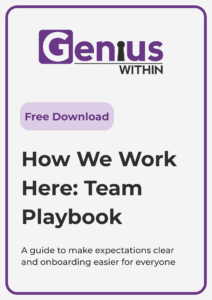Posted 22 Sep 2025
How HR Can Help Managers Onboard Neurodivergent Employees with Clarity and Confidence
Having explored how to design cognitively inclusive job roles and recruit without bias, we now turn to the onboarding stage — where first impressions and expectations can make or break long-term success.
The opening weeks of a role are particularly high stakes for neurodivergent employees, who often face hidden expectations or unspoken “rules” that aren’t immediately obvious. HR plays a pivotal role in bridging that gap — giving managers frameworks that enable clarity, flexibility and trust from day one.
When expectations are framed in neuroinclusive ways, individuals can work how they perform best — boosting productivity, reducing cognitive fatigue and enabling high-quality output. Managers gain more confidence, and early misunderstandings become far less likely — a win/win that lays the foundations for sustainable performance.
The Three Ingredients of Neuroinclusive Onboarding
1. Flexibility in “how” and “when”
Rigid 9–5 availability rarely reflects how our brains work best. Neuroinclusive onboarding focuses on deliverables rather than desk time. By giving employees autonomy over how and when work is completed — within clear boundaries — managers encourage ownership, accountability and stronger performance from day one.
✅ Quick tip: Provide templates for “flexibility conversations” during onboarding so managers can agree preferred working patterns, communication methods and shared expectations.
2. Transparent expectations and policies
Neurodivergent employees often experience higher anxiety around unspoken rules. Clear, written guidelines on performance expectations, communication norms and decision-making processes reduce ambiguity and early-stage stress.
✅ Quick tip: Encourage managers to share “how we work here” playbooks — covering everything from Slack/Teams/Email expectations, to response times and meeting etiquette — as standard onboarding practice.
Free Download!
Click here to download our free How We Work Here Team Playbook.

3. Plain, unambiguous language
Complex contracts and jargon-heavy policies can create unnecessary confusion and cognitive load. Neuroinclusive language removes guesswork — supporting faster ramp-up and reducing the risk of early misinterpretation.
✅ Quick tip: Provide plain-language contract and policy summaries, with designated Q&A slots for new starters to ask clarifying questions verbally, without judgment.
Why This Matters for HR and Managers
Clear onboarding frameworks help build trust and reduce misunderstandings during the most formative stage of the employee experience. With the right HR tools, managers can confidently support neurodivergent employees to fulfil their potential — without needing to be experts in neurodiversity.
Need help embedding neuroinclusive onboarding practices?
Genius Within supports HR teams to implement inclusive frameworks, strengthen manager capability and translate policy into practice. Explore our onboarding consulting services and training offers at geniuswithin.org.
Further Reading & Resources:
